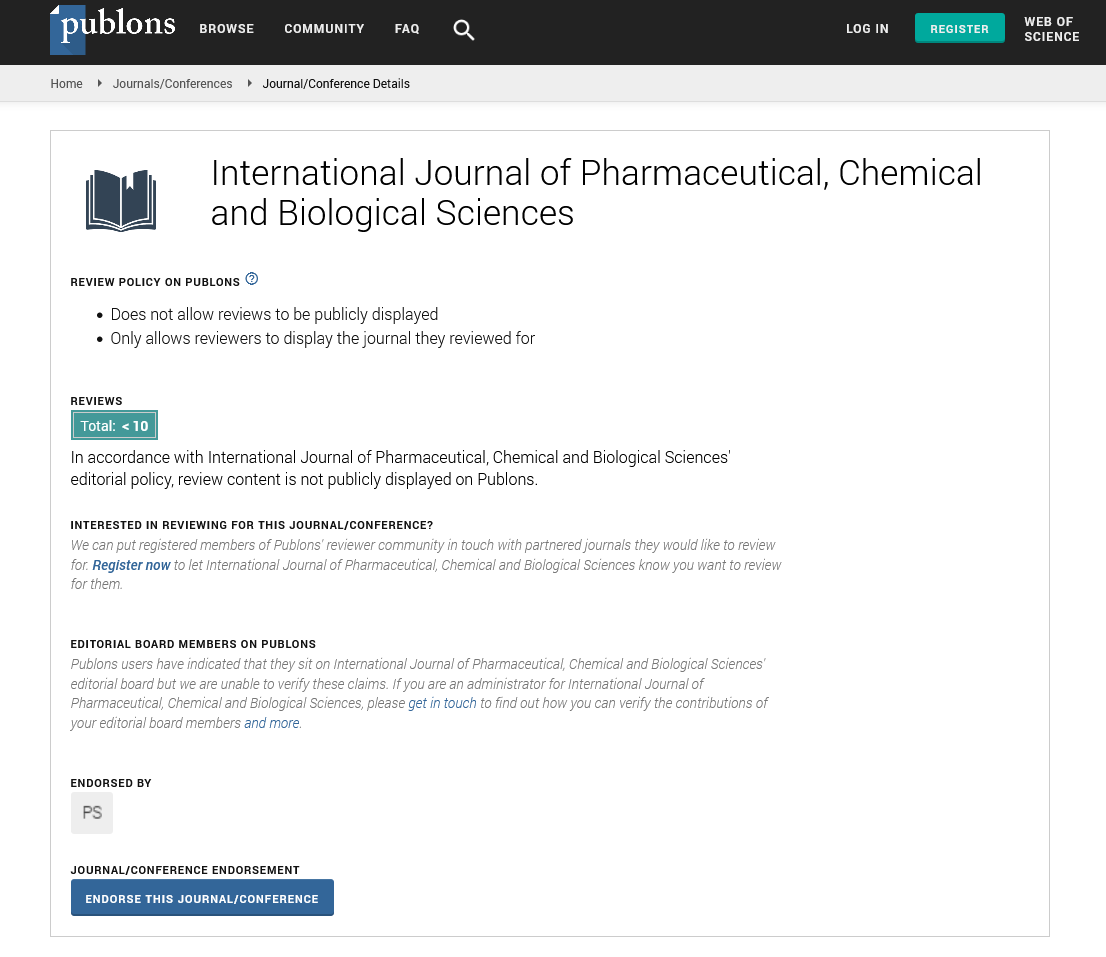Opinion - International Journal of Pharmaceutical, Chemical and Biological Sciences ( 2024) Volume 14, Issue 3
The Influence of Gut Microbiota on the Metabolic Fate of Oral Medications
Lisa Johnson*Lisa Johnson, Department of Biology, University of California, USA,
Received: 02-Sep-2024, Manuscript No. ijpcbs-24-148819 ; Editor assigned: 04-Sep-2024, Pre QC No. ijpcbs-24-148819 (PQ); Reviewed: 18-Sep-2024, QC No. ijpcbs-24-148819 ; Revised: 23-Sep-2024, Manuscript No. ijpcbs-24-148819 (R); Published: 30-Sep-2024
Introduction
The gut microbiota, consisting of trillions of microorganisms residing in the Gastrointestinal (GI) tract, plays a crucial role in numerous physiological processes, including digestion, immune modulation, and metabolism. In recent years, increasing evidence has highlighted the profound influence of gut microbiota on the pharmacokinetics and pharmacodynamics of oral medications. These microorganisms can affect the absorption, metabolism, and overall bioavailability of drugs, thereby influencing their efficacy and safety. The metabolic interactions between gut microbiota and oral medications are complex and multifaceted, involving direct and indirect pathways. One of the primary ways in which gut microbiota influences the metabolic fate of oral medications is through direct biotransformation. The diverse microbial community in the gut contains enzymes that can metabolize drugs into active or inactive metabolites. For example, the gut microbiota can reduce the azo bond in sulfasalazine, a drug used in the treatment of inflammatory bowel disease, to release its active metabolites, 5-aminosalicylic acid and sulfapyridine. Without the microbial reduction of sulfasalazine in the colon, the drug would remain inactive. In contrast, microbial metabolism can sometimes inactivate drugs, reducing their therapeutic effect. This is seen in the case of digoxin, a cardiac glycoside, which is partially inactivated by gut bacteria like Eggerthella lenta. Such biotransformation can affect the drug’s bioavailability and its therapeutic efficacy.
Description
Gut microbiota can also influence the host’s metabolic enzymes and transporters, indirectly impacting the fate of medications. By producing metabolites like Short-chain Fatty Acids (SCFAs) or secondary bile acids, gut microbes can modulate the expression of hepatic and intestinal drug-metabolizing enzymes, such as s (CYP) enzymes, and transport proteins like P-glycoprotein. These enzymes and transporters play critical roles in the absorption and metabolism of drugs. For instance, microbial metabolites may induce or inhibit CYP enzymes, thereby altering the rate at which drugs are metabolized in the liver. This modulation can affect drug clearance and plasma concentrations, leading to either enhanced or reduced drug efficacy or toxicity. The influence of gut microbiota on drug metabolism is also highly variable among individuals due to differences in microbial composition, a phenomenon known as interindividual variability.
Conclusion
This is because microbial β-glucuronidases deconjugate the inactive glucuronide form of SN- 38, regenerating the active toxic compound in the intestines. Modulating gut microbial activity, either through probiotics, prebiotics, or antibiotics, has been explored as a strategy to mitigate such adverse drug reactions. In conclusion, the gut microbiota exerts a significant influence on the metabolic fate of oral medications, both through direct microbial biotransformation and the indirect modulation of host drug-metabolizing enzymes and transporters. This interplay between gut bacteria and drugs contributes to interindividual variability in drug response and can influence drug efficacy, toxicity, and overall therapeutic outcomes. As research in this area advances, there is potential for developing personalized treatments based on an individual’s gut microbiome, optimizing drug therapy, and minimizing adverse effects.
Acknowledgment
None.
Conflict Of Interest
None.

